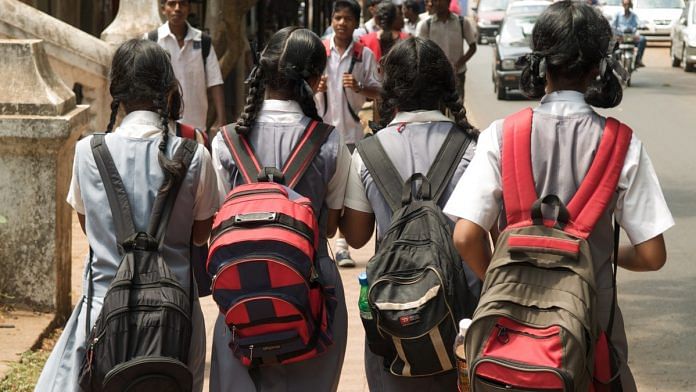New Delhi: Pay up or leave: That’s the message many private schools have sent to students who got enrolled in 2011 under the 25 per cent quota for economically weaker sections (EWS), which was introduced in line with the Right to Education Act.
According to a provision introduced that year, private schools were to provide free elementary education, from Class 1 to Class 8, to EWS students — a move meant to ensure every child had access to a good education.
Private schools “…shall admit in Class 1, to the extent of at least twenty five percent of the strength of that class, children belonging to the weaker section and disadvantaged group in the neighbourhood and provide free and compulsory elementary education till its completion”, Section 12 (1) (c) of the RTE Act reads.
Students who took admission in Class 1 in the 2011-12 batch have completed Class 8 this year, which means the RTE Act’s EWS quota no longer applies to them.
This has led the schools to put them on notice.
“Your son/daughter was admitted in this school in Weaker Section… category group. He/she completed elementary education (Class 1 to 8). In compliance with Article 12 (1) (c) of the RTE act, your child is eligible for free and compulsory education till Class 8,” Bharatiya Vidya Bhavan’s Mehta Vidyalaya at Kasturba Gandhi Marg, Delhi, wrote to an EWS student’s parents this January.
“You are therefore required to pay full school fee equivalent to open seat admitted students from the next academic session,” the letter, which ThePrint accessed, added.
According to lawyer and activist Ashok Aggarwal, St Lawrence Convent in Delhi’s Geeta Colony had asked 10 students of the EWS category who completed Class 8 not to come to school from the next session.
The school refused to comment when approached by ThePrint.
Also read: Under Arvind Kejriwal govt, enrolment & pass percentage have fallen in Delhi govt schools
Calls for change
According to a report by Indus Action, a private organisation that works closely with the government on RTE, most states started adopting Section 12 (1) (c) in earnest only in 2013-14, two years after its introduction. As many as 5.1 lakh children took admission under the quota in the 2013-14 batch.
Only a few states, including Delhi and Haryana, complied with the provision in 2011-12, which is why several cases of eviction are being reported from the national capital this year.
There have been several calls over the years to extend the provision’s purview till Class 12, when school education ends, with activists as well as several states approaching the Union Human Resource Development (HRD) Ministry on the matter.
“We had written to the HRD ministry last year, asking them to extend the legal guarantee of free education for children up to Class 12,” said activist Aggarwal. “Had that been done, children would not be staring at a bleak future.”
A senior official in the ministry confirmed receiving feedback from states about evictions due in the next two years, and told ThePrint that the government was working on resolving the issue soon.
In 2018, for example, the ministry discussed a proposal to extend RTE provisions to children aged below six years, the pre-primary level, with the government also mulling stretching it till Class 12.
In its manifesto released Tuesday, the Congress had weighed in on the matter too.
“Congress promises that school education from Class 1 to Class 12 in public schools shall be compulsory and free,” it said. “Suitable amendments will be made in the Right to Education Act, 2009. We will end the practice of charging special fees for different purposes in public schools,” the party added.
In the meantime, some schools where the first batch of EWS quota beneficiaries is yet to clear Class 8 say they have a safety net in place to ensure they are not evicted.
“EWS children in my school are in Class 7 currently so there is no question of eviction,” said Ameeta Mulla Wattal, the principal of Springdales School, Delhi.
“Even if they had completed Class 8, we would not have asked the children to leave. Our school has had many scholarships since a long time for letting deserving children continue with their studies.”
Also read: Delhi govt schools beat private schools in class 12 results. Reason: 50% flunk class 9




I am Ruchika ,
I live in Punjab Ludhiana
I know some poor kids who need education.
Please help them to be educated.
Thanks & regards